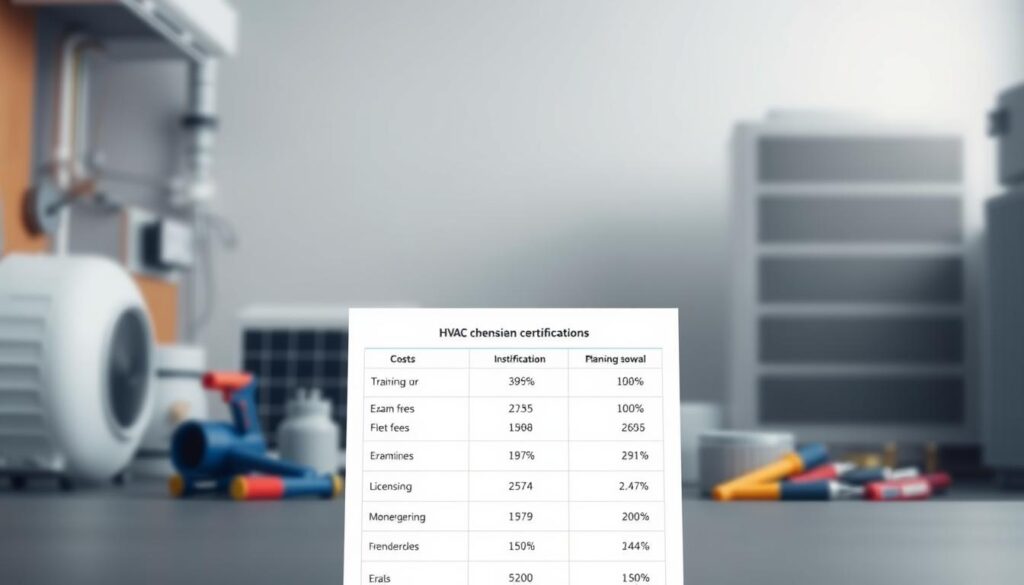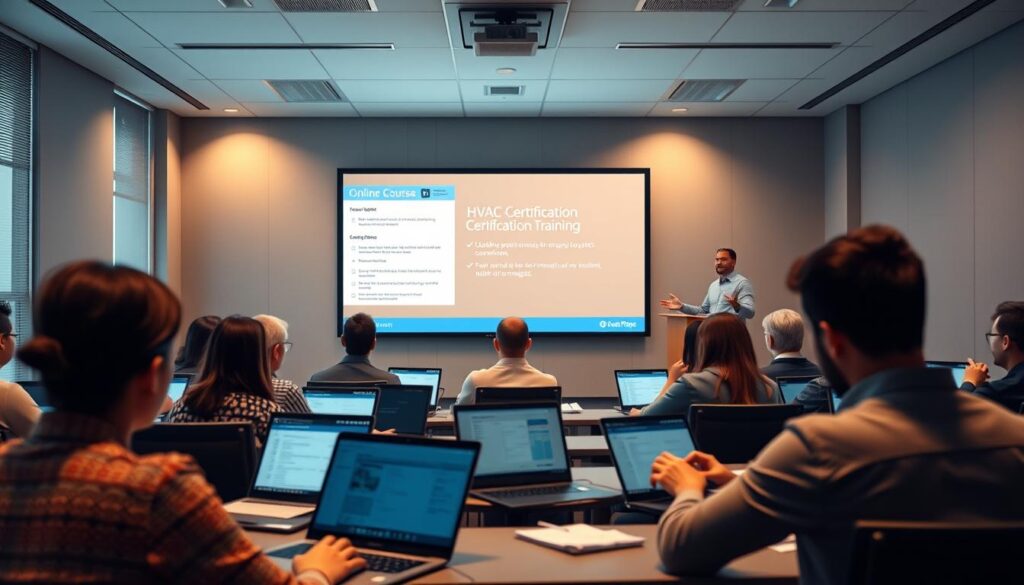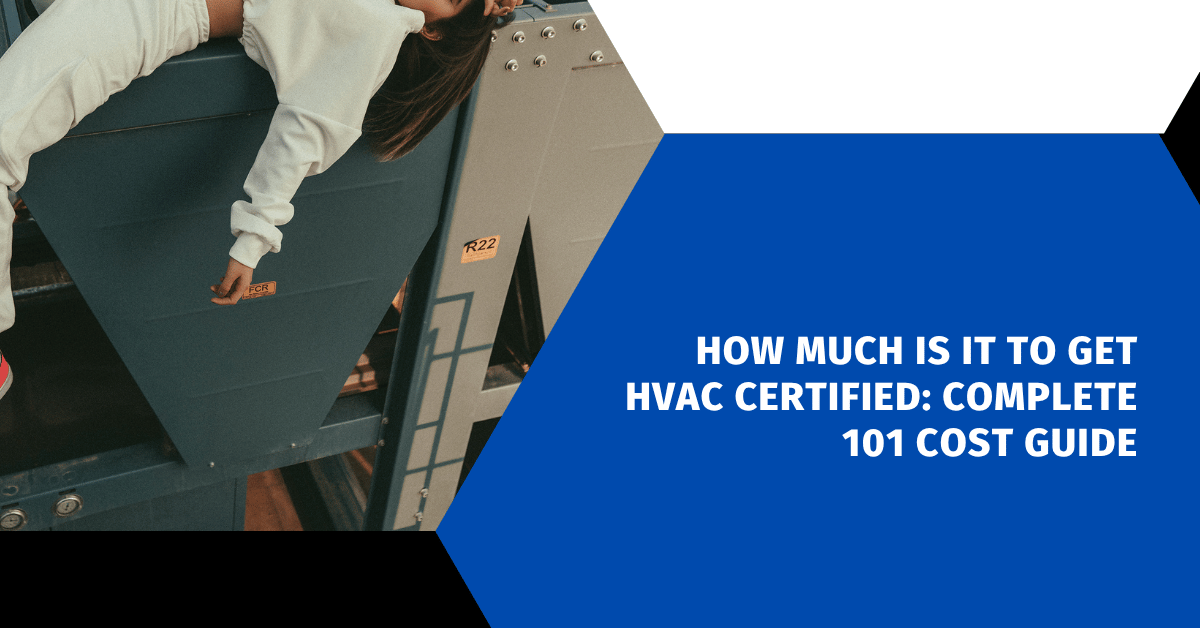Affiliate Disclosure
HVAC Guide Guys is a participant in the Amazon Services LLC Associates Program, an affiliate advertising program designed to provide a means for sites to earn advertising fees by advertising and linking to Amazon.
How Much Is It to Get HVAC Certified? Are you curious about the cost of starting a career in heating, ventilation, and air conditioning? Becoming an HVAC certified professional might be more affordable than you imagine.

With 441,000 HVAC technicians in the U.S., the field is booming. Knowing the cost of HVAC certification is your first step to a fulfilling career. It offers job security and good pay.
Figuring out the cost of HVAC certification can be daunting. This guide will cover all the financial details of your journey. It will help you make a smart choice for your future.
Key Takeaways
- HVAC certification offers significant career opportunities
- Costs depend on the training and certification type
- There are many ways to get financial help
- Certification can boost your earnings
- The HVAC industry is growing fast
Table of Contents
Understanding HVAC Certification Basics
Getting an hvac technician certification is key for those aiming for a career in heating, ventilation, and air conditioning. This guide will walk you through what you need to know and why certification matters.
The HVAC field needs experts who show their skills with recognized credentials. To become a certified tech, you’ll need to follow a few important steps.
Types of HVAC Certifications Available
There are many hvac certification exams for different career levels and areas of focus:
- EPA Section 608 Certification (Core, Type I, II, III)
- NATE (North American Technician Excellence) Certification
- HVAC Excellence Professional Level Certification
- RSES (Refrigeration Service Engineers Society) Certifications
Why HVAC Certification Matters
Certification offers many advantages for HVAC hopefuls:
- Shows you’re technically skilled
- Makes you more attractive to employers
- Can lead to higher pay
- Ensures you follow industry rules
Legal Requirements for HVAC Work
Most states require licenses and certifications to legally do HVAC work. Your certification shows you meet professional standards and know safety rules.
Professional certification is not just a credential—it’s your passport to a successful HVAC career.
Each certification has its own rules. Make sure to check your state’s laws to follow local standards.
Explore Our HVAC Shop
Looking for top-rated HVAC tools, parts, and accessories? Visit our shop and find the perfect solution for your needs.
Visit the ShopEPA 608 Certification Requirements and Costs
Getting EPA 608 certification is key for those starting in HVAC. It shows you know how to handle refrigerants. This is a must for hvac license requirements. The Environmental Protection Agency requires it to keep refrigerants safe in the U.S.
The EPA 608 certification has four types. Each one is for different refrigeration and air conditioning needs:
- Type I Certification: Small appliances like window air conditioners
- Type II Certification: High-pressure appliances such as commercial refrigeration
- Type III Certification: Low-pressure appliance systems
- Universal Certification: Covers all refrigerant handling scenarios
The cost for EPA 608 certification is between $100 and $300. This depends on the exam and study materials. Most choose the Universal Certification for more job chances.
| Certification Type | Exam Cost | Typical Preparation Expenses |
|---|---|---|
| Type I | $75-$125 | $50-$100 |
| Type II | $75-$125 | $50-$100 |
| Type III | $75-$125 | $50-$100 |
| Universal | $150-$250 | $100-$200 |
Great news: EPA 608 certification lasts forever unless taken away for big mistakes. Spend on good study materials and practice tests to pass on your first try.
How Much Is It to Get HVAC Certified
Getting an HVAC certification needs careful planning. Knowing all the costs helps you budget for your career. It’s not just about exam fees. You’ll face other expenses too.
Looking into HVAC certification costs, you’ll find several key areas to consider:
- Training program tuition
- Certification exam fees
- Study materials
- Required tools and equipment
- State licensing expenses
Basic Certification Costs
The main costs for HVAC certification are between $1,200 and $5,000. Your total cost depends on the program, location, and level of certification. Community colleges usually cost less than private schools.
Additional Training Expenses
There are extra costs to consider. Specialized training materials, practice exams, and retake fees can add hundreds of dollars. Some programs include these costs, while others charge extra.
Hidden Fees and Considerations
Unexpected costs can pop up for HVAC technicians. These might include:
- Background check fees
- Professional liability insurance
- Specialized safety equipment
- Ongoing recertification costs
Looking into state-specific rules helps you plan for these extra costs. This way, you can budget better.
Explore Our HVAC Shop
Looking for top-rated HVAC tools, parts, and accessories? Visit our shop and find the perfect solution for your needs.
Visit the ShopHVAC Training Program Options
Looking into hvac training programs is a great first step for a career in heating, ventilation, and air conditioning. You’ll need to pick the right education that fits your goals and how you learn best.
There are several ways to get hvac career training, each with its own benefits:
- Vocational Schools: Get technical training with lots of hands-on practice.
- Community Colleges: Get a full program with an associate degree.
- Apprenticeship Programs: Learn on the job while earning a salary.
- Online Certification Courses: Learn at your own pace, perfect for those working.
When picking an HVAC training program, look at these important factors:
| Accreditation Body | Program Quality Indicators |
|---|---|
| HVAC Excellence | Rigorous curriculum standards |
| PAHRA | Industry-recognized certification |
| HVAC Technical Institutes | Updated technological training |
Your chosen program should cover refrigeration systems, electrical parts, and environmental rules. It’s key to get practical skills for real HVAC jobs.
Investing in quality HVAC training today opens doors to a stable and growing career tomorrow.
Time Investment for HVAC Certification
Starting an HVAC career needs careful planning and knowing how much time it takes to get certified. Your path to becoming a professional HVAC technician involves several stages. These stages require time and can shape your career.
Program Duration Expectations
The time to finish your HVAC certification varies based on your choice. Usually, programs last from:
- Technical school programs: 6-24 months
- Community college programs: 2-4 semesters
- Online self-paced training: 3-5 months
Study Time Requirements
Passing the HVAC certification exam needs a lot of study time. Most students spend:
- Part-time students: 10-15 hours per week
- Full-time students: 25-35 hours per week
- Recommended study schedule: 2-3 hours daily
Certification Exam Preparation
Getting ready for your HVAC certification exam needs a plan. Here are some tips:
- Create a structured study schedule
- Use practice exams and study guides
- Join study groups or online forums
- Focus on key technical knowledge areas
Your total time for HVAC certification can be 3 to 24 months. It depends on your learning speed and program choice. The most important thing is to stay consistent and dedicated to your HVAC career goals.
Explore Our HVAC Shop
Looking for top-rated HVAC tools, parts, and accessories? Visit our shop and find the perfect solution for your needs.
Visit the ShopOnline vs. Traditional HVAC Certification Paths

Choosing the right path for HVAC certification can be tough. Students now have two main options: online HVAC certification programs and traditional in-person training. Each way has its own benefits for those wanting to be HVAC pros.
Online HVAC training programs are very popular today. They offer great flexibility for students who work and study at the same time. You can do your coursework from home, anytime, and learn at your own speed.
- Flexible scheduling
- Lower overall costs
- Self-paced learning
- Access to digital resources
Traditional classroom training gives you hands-on experience, which many find very valuable. These programs let you work with equipment and get feedback right away. You learn directly from instructors.
“The best HVAC training combines theoretical knowledge with practical experience.” – HVAC Industry Expert
When picking between online and traditional HVAC training, think about your learning style, schedule, and career goals. Some programs mix online learning with in-person workshops.
Both paths can lead to HVAC certification success. What’s most important is your dedication to learning and improving your skills.
State-Specific HVAC Licensing Costs
Getting an HVAC license can be tricky because each state has its own rules and costs. It’s important for those starting their HVAC career to know these differences.
The cost and steps to get an HVAC contractor license vary a lot in the U.S. HVAC techs need to look up their state’s rules to follow them and stay professional.
Licensing Fee Variations by State
Licensing fees for HVAC pros change a lot from state to state. Some states charge little, while others ask for a lot of money for certification and papers.
- California charges between $100-$300 for the first license.
- Florida asks for about $250 for contractor certification.
- Texas fees are usually $200-$400.
- Michigan’s mechanical licenses depend on where you are.
Renewal Costs and Requirements
To keep your HVAC contractor license, you need to renew it and might have to take more classes. Each state has its own rules for keeping your license up to date.
| State | Renewal Fee | Renewal Frequency | Continuing Education Hours |
|---|---|---|---|
| California | $150 | Every 2 years | 4 hours |
| Florida | $189 | Every 2 years | 14 hours |
| Texas | $125 | Every 2 years | 6 hours |
Additional State-Specific Expenses
There are extra costs for HVAC pros, like:
- Local registration fees
- Background check costs
- Insurance needs
- Special local endorsements
Pro tip: Always check with your state’s licensing board for the latest HVAC license rules and costs.
HVAC Apprenticeship Programs and Associated Costs
HVAC apprenticeship programs are a great way to start your HVAC career. They mix hands-on work with classroom learning. This gives you a solid foundation in your field.
The cost of these programs varies from $500 to $2,000. Many employers sponsor these programs. This could mean you get to train without paying much or anything at all.
- Earn while you learn
- Gain hands-on technical experience
- Receive structured professional guidance
- Build industry connections
Apprenticeships usually last 3-5 years. During this time, you’ll learn a lot about HVAC systems.
| Program Type | Duration | Typical Cost |
|---|---|---|
| Union Apprenticeship | 4-5 years | $0-$1,500 |
| Non-Union Apprenticeship | 3-4 years | $500-$2,000 |
Look for apprenticeship programs at local trade schools, community colleges, and state labor departments. These programs must meet national standards. Your HVAC career begins with the right training.
Explore Our HVAC Shop
Looking for top-rated HVAC tools, parts, and accessories? Visit our shop and find the perfect solution for your needs.
Visit the ShopRequired Tools and Equipment Investment
Starting your journey to become an HVAC technician means investing in the right tools and equipment. As you start your training, knowing the essential tools is key to success in the HVAC field.

Building a solid toolkit is essential for your HVAC career. The right tools can greatly improve your performance and efficiency.
Essential Tool List for HVAC Professionals
- Multimeter for electrical testing
- Refrigerant gauges
- Manifold gauge set
- Pipe cutter and flaring tools
- Vacuum pump
- Digital thermometer
- Leak detector
Equipment Cost Breakdown
| Tool Category | Estimated Cost Range | Importance Level |
|---|---|---|
| Basic Hand Tools | $200 – $500 | Essential |
| Electrical Testing Equipment | $300 – $800 | Critical |
| Specialized HVAC Instruments | $500 – $1,500 | Professional |
Where to Purchase Quality HVAC Tools
When buying tools, look at trusted suppliers like Ferguson HVAC, Grainger, and Amazon Professional. Local trade stores also offer good prices and advice for HVAC techs.
Investing in tools is a big part of getting ready for your HVAC technician certification. Plan your budget well and choose quality tools for your future career.
Continuing Education and Recertification Expenses
Keeping your HVAC certification up to date requires ongoing learning. The cost of getting certified is just the beginning. You’ll also need to plan for continuing education and recertification costs.
States have different rules for HVAC continuing education. Technicians usually need to take several hours of training every few years. This keeps them current with new technologies and safety rules.
- Average continuing education hours: 4-16 hours per renewal cycle
- Typical recertification frequency: Every 2-3 years
- Cost range for continuing education courses: $50-$300
Your education might include online classes, workshops, and conferences. These help you:
- Update your technical skills
- Learn about new HVAC tech
- Keep your professional credentials
- Meet other industry pros
“Continuous learning is the minimum requirement for success in any field.” – Brian Tracy
Some states offer flexible recertification options. For example, you might be able to take courses online. This saves on travel costs and makes learning easier.
| Education Type | Average Cost | Time Commitment |
|---|---|---|
| Online Courses | $75-$150 | 4-8 hours |
| In-Person Workshops | $150-$300 | 8-16 hours |
| Industry Conferences | $200-$500 | 1-3 days |
Pro tip: Check with your local HVAC licensing board for specific continuing education requirements in your state.
Explore Our HVAC Shop
Looking for top-rated HVAC tools, parts, and accessories? Visit our shop and find the perfect solution for your needs.
Visit the ShopFinancial Aid and Payment Options for HVAC Certification
Getting an HVAC certification doesn’t have to cost a lot. There are many ways to get financial help. This makes it easier to pay for your training and reach your career goals.
Veterans have great chances to get financial help. The GI Bill offers big educational benefits for those who served. Programs like MyCAA also help military spouses who want to work in HVAC.
- Federal Financial Aid Options
- Pell Grants
- Federal Student Loans
- Direct Subsidized Loans
- Military-Specific Benefits
- GI Bill
- MyCAA Benefits
- Reservist Educational Assistance
Many HVAC schools have flexible payment plans. This makes it easier to manage costs. Some schools even offer scholarships for technical training. This can help students pay less out of pocket.
| Financial Aid Source | Potential Coverage | Eligibility Requirements |
|---|---|---|
| Pell Grants | Up to $6,495 annually | Based on financial need |
| GI Bill | Full tuition coverage | Active/veteran military service |
| Employer Tuition Assistance | Partial to full coverage | Employment with participating company |
Pro tip: Always look into different funding sources. Also, talk to your HVAC training program’s financial aid office. They can help you find the best options.
“Investing in your HVAC certification is investing in your future career success.” – Career Development Expert
Don’t let money worries stop you from getting your HVAC certification. With some planning and research, you can find the right financial help. This will help you start your professional journey.
Conclusion
Getting an HVAC certification is a smart move for your career. The cost can vary from $1,000 to $15,000, based on your training and level. HVACR technicians in the U.S. make a median of $58,230, making it a great career choice.
Planning your HVAC training financially is key. You need to know about tuition, certification fees, tools, and apprenticeships. Each step you take adds to your skills and opens doors in a booming industry.
Look into different training paths like community colleges, trade schools, and online courses. Make sure to check your state’s licensing rules and look for financial aid. Your hard work in HVAC can lead to a fulfilling and stable career.
Are you ready to begin your HVAC journey? Start by looking into local programs, talking to professionals, and planning your education. With the right effort and planning, your technical skills can turn into a rewarding and lucrative career.
FAQ
How much does it typically cost to get HVAC certified?
How much does it typically cost to get HVAC certified?
FAQ
How much does it typically cost to get HVAC certified?
HVAC certification costs can vary from
FAQ
How much does it typically cost to get HVAC certified?
HVAC certification costs can vary from $1,000 to $15,000. This includes tuition, exam fees, and study materials. Community colleges are often cheaper, while vocational schools cost more.
What are the different types of HVAC certifications I can obtain?
You can get EPA Section 608, NATE, and state-specific licenses. Each shows different levels of skill in HVAC.
Do I need to be certified to work as an HVAC technician?
Yes, you need certification. The EPA Section 608 is required for refrigerants, and most states need a license. Without it, you can’t legally work in HVAC.
How long does it take to become HVAC certified?
It takes 6 months to 2 years to get certified. Vocational programs last 6-12 months, and associate degrees take up to 2 years. Apprenticeships are 3-5 years, mixing classroom and on-the-job training.
Can I get HVAC certification online?
Yes, online programs are available. But, most require hands-on training. Online learning offers flexibility but lacks the practical experience needed in HVAC.
What is the EPA 608 certification, and how much does it cost?
The EPA 608 is needed for refrigerant work. Exam fees are $20 to $150, depending on the type. There are four types: Type I, Type II, Type III, and Universal.
What financial aid options are available for HVAC certification?
You can get federal student aid, Pell Grants, and student loans. Veterans and employers also offer help. Many schools have payment plans and scholarships for HVAC training.
What tools do I need to become an HVAC technician?
You’ll need manifold gauges, multimeter, and more. Initial costs are $500 to $2,000, depending on the tools.
How much do HVAC certification renewal and continuing education cost?
Renewal and continuing education costs are $100 to $500 every 1-3 years. This includes license renewal and courses to keep up with industry changes.
Are apprenticeship programs a cost-effective way to get HVAC certified?
Yes, apprenticeships are cost-effective. They offer paid training and minimal costs. You earn while you learn and gain valuable experience.
,000 to ,000. This includes tuition, exam fees, and study materials. Community colleges are often cheaper, while vocational schools cost more.
What are the different types of HVAC certifications I can obtain?
You can get EPA Section 608, NATE, and state-specific licenses. Each shows different levels of skill in HVAC.
Do I need to be certified to work as an HVAC technician?
Yes, you need certification. The EPA Section 608 is required for refrigerants, and most states need a license. Without it, you can’t legally work in HVAC.
How long does it take to become HVAC certified?
It takes 6 months to 2 years to get certified. Vocational programs last 6-12 months, and associate degrees take up to 2 years. Apprenticeships are 3-5 years, mixing classroom and on-the-job training.
Can I get HVAC certification online?
Yes, online programs are available. But, most require hands-on training. Online learning offers flexibility but lacks the practical experience needed in HVAC.
What is the EPA 608 certification, and how much does it cost?
The EPA 608 is needed for refrigerant work. Exam fees are to 0, depending on the type. There are four types: Type I, Type II, Type III, and Universal.
What financial aid options are available for HVAC certification?
You can get federal student aid, Pell Grants, and student loans. Veterans and employers also offer help. Many schools have payment plans and scholarships for HVAC training.
What tools do I need to become an HVAC technician?
You’ll need manifold gauges, multimeter, and more. Initial costs are 0 to ,000, depending on the tools.
How much do HVAC certification renewal and continuing education cost?
Renewal and continuing education costs are 0 to 0 every 1-3 years. This includes license renewal and courses to keep up with industry changes.
Are apprenticeship programs a cost-effective way to get HVAC certified?
Yes, apprenticeships are cost-effective. They offer paid training and minimal costs. You earn while you learn and gain valuable experience.

